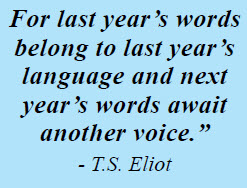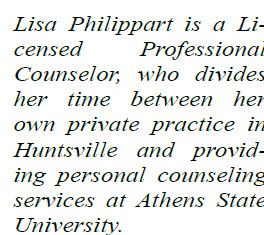Making New Year’s Resolutions for Your Mental Health
 By: Lisa Philipart
By: Lisa Philipart
I know what you’re thinking. New Year’s resolutions are a waste of time. Most of us have either come up with one or two changes that we want to make in the new year, or we’ve written down a whole list of things. We know that one or two months in, we are back to our old habits. This past year I tried something different. I had attended a leadership conference where the suggestion was made to pick a word that represented the transformation we wanted to see during the year. This was to be our guiding, overall goal of what we wanted to see different/better by the end of the year. I really liked this idea, so I chose the word CLARITY. There was no specific list of actions to have completed…just a reminding principle for my actions. This worked really well for me, and I plan on doing it again for 2019.

So let’s look at a few things that we can do on a regular basis to benefit our mental health. First, I encourage you to Do Something That You Love Every Day. Even if it’s just for 10, 20, or 30 minutes…read, go for a walk, talk to someone you love, or listen to your favorite music. These activities can bring you a sense of peace, helping you to feel relaxed even for just part of the day. This is called making time for yourself. And it’s okay to do this.

Second, Make a Commitment to Stay Informed. Knowing what’s going on in the world of research can help you find out whether there are new ideas out there that might improve your quality of life. For example, research shows that getting outside every day, even in the winter, is important to getting enough vitamin D, which is essential to improving your mood and overall well-being.
Third, the National Alliance on Mental Illness (NAMI) has been promoting a stigma-free movement to Reduce the Stigma of Mental Illness. I believe that we all struggle with our mental health. But, some research shows that the stigma is worse than the mental illness itself. You can help to change society’s way of thinking by letting people know when they use language that is offensive or improper. The way to do this is to encourage everyone to see the person, not the illness. A simple change in sentence structure can go a long way. For example, People First Language refers to the individual first and the “challenge” second, such as saying, “a child with autism” instead of “the autistic child.”

Our fourth resolution to benefit your mental health is Take Care of Your Physical Health, Too. We’ve all heard this over and over again, and there are plenty of studies showing how proper exercise, sleep, and diet can reduce mental illness symptoms and improve overall health. But how do we find the motivation, time, and effort to do these things? I encourage establishing a routine and sticking with it. For example, have set days and times during the week for working out. Make a grocery shopping list of healthy food options and then prepare meals ahead of time. These tasks are difficult starting out, but we like patterns and schedules, so stick to them. And finally, Share Your Story. You can express yourself by opening up about your experiences, which will help others relate to you. Do you struggle with anxiety? If you feel comfortable, you can explain about the physical symptoms you experience when you are nervous or panicking. And then explain what coping skills have worked for you. If community speaking is not your thing, write an article or start a blog. Even journaling can help you to feel more confident in understanding and presenting what you are experiencing.
Are you ready for a healthier and happier 2019? Take a few moments to reflect on where you are right now in mind, body, and spirit. What will be your motivating word? Once you have decided on a word, write down some of the ways you will know you have achieved your goal. And then remind yourself of your word often…daily, weekly, or monthly. I’ll check back with you next year to let you know what word I have chosen to work on for 2019. Resolve to be a better you in the coming year!
By: Lisa Philippart
Licensed Professional Counselor